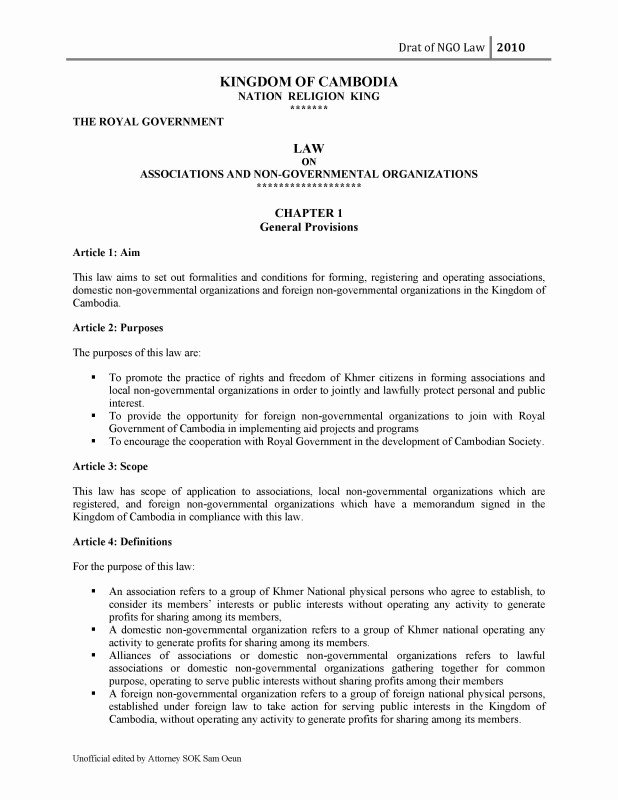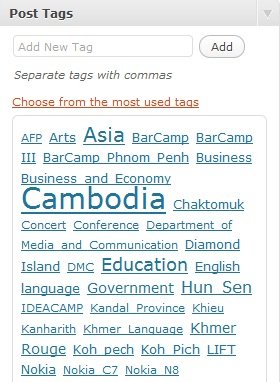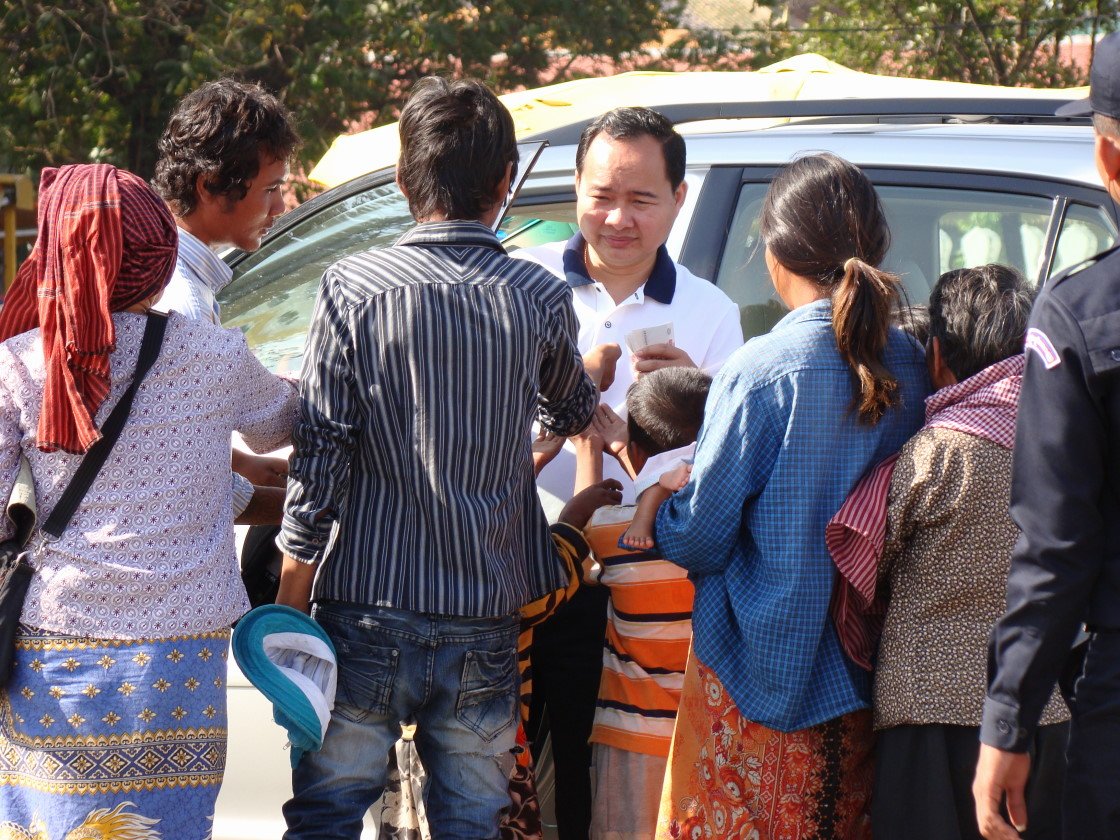Author - Dara Saoyuth
[slideshow] By: Dara Saoyuth 30/01/2011I’ve been to riverside today noon after lunch since there was not many things to do. With my small camera, I’ve taken some photos of birds, people, and view along river side in front of Royal Palace. I post some here and hope you all enjoy! Cheers,
For me, it’s not the first time to get a kind of sms like this, mostly from anonymous people. I usually get these sms before any big occasions such as Valentine day, Christmas Day, and New Year Day.
I’m wondering if this message was first sent by mobile phone operator and then by people who got it and afraid they will get bad luck if not forwarding it to another people.
I’m sure that not only me that feel annoyed and irritated to recieve this kind of sms, so I hope that it won’t happen again to us.
By: Dara Saoyuth 26/01/2011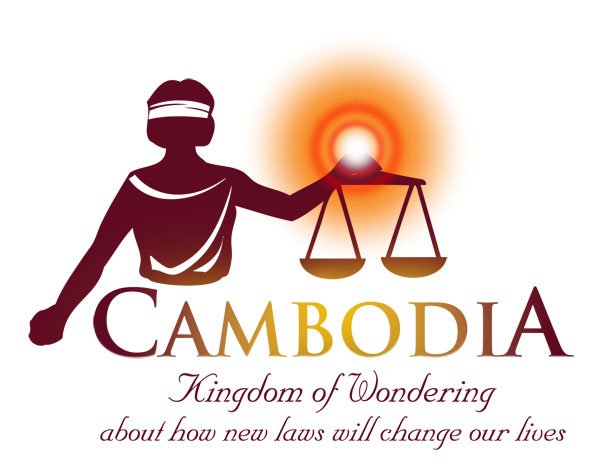 Born in Kandal’s Ponhea Leu district, this young man decided to leave home for Phnom Penh in 2009 to get a better education. Chan Sokneang, 22, is now a sophomore in English literature at the National University of Management.
Born in Kandal’s Ponhea Leu district, this young man decided to leave home for Phnom Penh in 2009 to get a better education. Chan Sokneang, 22, is now a sophomore in English literature at the National University of Management.
Staying independently in Neakvon Pagoda, Chan Sokneang is struggling to make a living as an intern at an organisation in the city, hoping to gain some experience for his future goal as an NGO staff member after graduation. He hopes to land his dream job so he will not have to follow in his parents’ footsteps and become a farmer.
“I am very concerned about job opportunities that NGOs provide since the draft of the NGO law might affect their recruitment,” said Chan Sokneang.
Released on December 15, 2010, the draft law on Associations and Non-governmental Organisations aims to “set out formalities and conditions for forming, registering and operating associations, domestic non-governmental organisations and foreign non-governmental organisations in the Kingdom of Cambodia”.
Chan Sokneang said he was worried that the law would decrease the number of NGOs, which could cut down his opportunities to work for an NGO in the future.
In Samrithy, the Executive Director of NGO Education Partnership, said the new law constrained the cooperation between national and international NGOs, but it will not lessen NGOs’ careers. Instead, the law would make the recruitment process more complicated.
He added that this law did not attract donors to provide funds to Cambodia. He said: “If the donors stop funding Cambodian organisations, many NGOs staff will be laid off,” he said, adding that the law should be made to attract donors rather than to discourage them from helping Cambodia.
However, the concern of not having many NGO job opportunities is not the real issue in Cambodia’s job market. Sandra Damico, the Managing Director of HR Inc Cambodia, said NGOs do not provide the overwhelming majority of jobs in the market. It was the small and medium enterprises sector that employed the most people with sectors such as garments, tourism, finances, telecoms etc providing the most formal and documented employment.
She said: “I don’t think that the law will have a significant impact on creating employment opportunities – the private sector is the sector that will and does generate the most employment.”
Although the law does not greatly affect the job opportunities of young Cambodians, it may act as a barrier in framing NGOs’ activities.
There are 11 chapters with 58 articles in the draft law. Sok Samoeun, an executive director at Cambodian Defenders Project, said the government tends to control and limit NGOs and association’s activities by using the law.
“At the start of each month, they have to draft and send their activities to the government and also at the end of the month they have to do activities and financial reports to the government, which seems like they have to report everything,” Sok Samoeun explained.
According to Article 6 of the law, an association and non-governmental organisation or alliance of associations or local non-governmental organisations which are not registered or do not have a memorandum signed in accordance with this law shall not be allowed to operate any activity in the Kingdom of Cambodia.
Sok Samoeun said the registration should be the right for NGOs and associations.
On January 21 this year, there was a meeting to discuss the draft law at the Ministry of Interior between the government and NGOs representatives including Cooperation Committee for Cambodia, NGO Forum, Medicam, Adhoc and Oxfam.
People who attended the meeting said the new law is going through a process and it is very important to understand each side so the law will work for all after being implemented. They said the law was not being made to violate anyone’s rights.
“If any NGO or association feels that any point in the law is violating their rights, please raise the specific article so that we can discuss it with each other,” said Try Sokheng, who was at the meeting.
Try Sokheng said the law was not being made to close any NGOs or associations down, but the government just wanted all NGOs and associations to register at the ministry of interior within 180 days of the law pass being passed.
“It depends on them. If they don’t want to continue, they can close and if they want to continue, they have to register,” said Try Sokheng, adding that some NGOs and associations that don’t have clear goals might not be able to exist anymore.
By: Dara Saoyuth & Tang Khyhay This article was publish on LIFT, Issue 55 published on January 26, 2010 You can download this draft law in English by CLICKING HERENumbers of blogs and websites keep increasing from day to day. Not many people visiting can be a frustrating thing for blog and website owners. There are plenty of way to improve your blog/website state, but I’d like to raise 5 main points for Student Blog visitors. I think some of you also own at least your personal blog, so let’s have a look together. Cheers,
1. Use Social Network
Social network programs are very popularly nowadays especially Facebook, Twitter, Hi5, etc. In addition to having more friends online, you can improve your blog/website visitors by announcing it on these social programs. It is an easy way and you don’t have to pay for this.
2. Search Engine Optimization (SEO)
The Web is full of great content that will never be seen outside of the author’s screen because the writer has failed to understand that just a few simple tweaks in the blogging process can increase search-engine visibility.
Search Engine including Google, Bing, and Yahoo is another powerful way to bring visitors to your blog/website. Search Engine will show your blog/website when someone search any keyword existed in your blog/website contents.
You can improve search engine capacity by learning how to use tag including heading tag and title tag.
3. Create relationship with another sites
You cannot live alone on the earth and so as your website/blog that it cannot stay isolate on the internet world.
When you have more friends on the internet, you will have a big amount of visitors.
You can improve it by putting link to the other people’s website/blog and they will link you back.
4. Offline Advertising
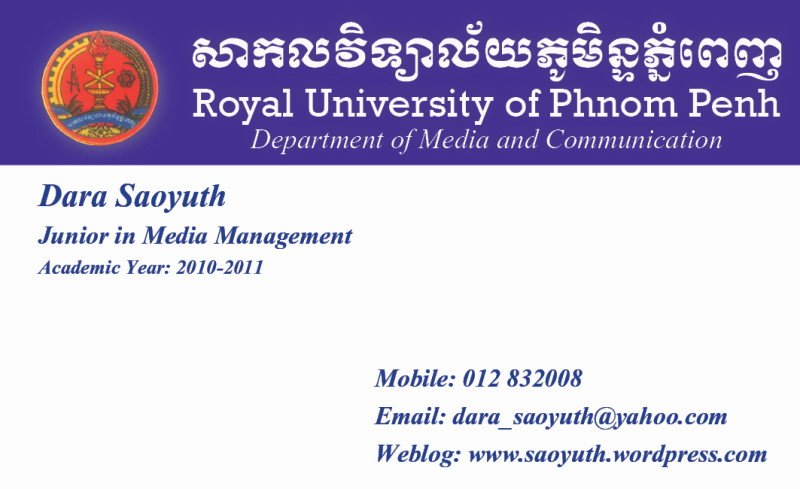 Another easy to make the other people know your blog/website is to deliver posters, business cards that include your web address to your friend or people you meet.
Another easy to make the other people know your blog/website is to deliver posters, business cards that include your web address to your friend or people you meet.
Those people will remember yours longer. You can also advertise it on newspaper or magazine.
5. Online advertising
Well, if you have money, you should consider this method. You can buy space from other famous websites to put yours in them. Or you can use Facebook Ads or Google ads.
By: Dara Saoyuth 25/01/2011
Topic: “In general, people are living longer now. Discuss the causes of this phenomenon. Use specific reasons and detail to develop your essay.”
Jeanne Calment of France died at the age of 122 and 164 days, and Shigechigo Lzumi of Japan died at the age of 122. Along with this, Gertrude Bains, a 115-year old American, is still alive, and Kama Chinen is now living at his age of 144. I am very surprised when I heard this news from my radio. I think that these people are ones showing that the world has stepped into a new era when people tend to live longer and longer. In the past, rarely did people live up to the age of 50 or 60; however, presently, living up to age seemingly becomes normal. Comparing to more than one hundred years ago when the life expectancy for people was just 22 for males and 25 for females, the life expectancy in 2008 is 64.3 and 68.35 for males and females respectively. This tendency does not naturally occur. In deed, there are many factors causing it.
First of all, advanced medical care and education of health contribute so much to prolonging people’s lives. Scientists, nowadays, are seeking new medicines that effectively cure many grave diseases. The health care centers are established throughout the world to meet the physical and mental needs of people. Along with this, many high-tech medical equipment such as X-ray scanner, disease analyzing machine and operation equipment have been produced to enhance the quality of medical services. Unlike people in hundred years ago who could lose their lives even just they had a cold, people on these days can receive health care services whenever they get sick, or even when they feel uncomfortable. Plus, people now become well aware of how to take care their health, and they can prevent themselves from infectious or even epidemic diseases, for they can get enough information from health agents or advertisements on radios or televisions. As a result, when any epidemic disease breaks out, everyone is alert, and each nation tries to take an urgent action to prevent it from spreading worldwide. For instance, in 1976, when the swine flu broke out, there were approximately 40 millions people infected, but this horrific event can not happen again today. Recently, when this virus just broke out, each country took an action immediately, and we all got enough information about it already.
Besides, food stability helps reduce the number of people who die of hunger. In primitive time, people practiced poor agriculture such as slash-and-burn farming that depended much on weather. If the weather was friendly, the crops would grow well, and people could gain enough food for that season. Unfortunately, if the weather became harsh, drought or flood, people would face a starvation, and thousands of people could die of food shortage. In contrary, people these days know
how to store water for farming. Many huge dams and irrigation systems are built, containing millions of cubic meters of water to support their agriculture and make their cultivation less dependent on nature. Because of a possibility to do farming two or three times a year by using of high-tech cultivation, people today can ensure the stability of food for themselves, which is a main factor that can help lengthen their lives.
A decrease of wars and political unrest also enable human beings to live longer. Before twenty-first century, the world seemed disorder in politics, economy and society. Rarely was any international law enacted. Most countries at that time were led by monarchy, dictatorship or colonialism. Wars and rebels were usually seen, and millions of people were involved; thus, thousands of them were killed and injured while other thousands were living with fearfully every day. For instance, during World War II, there were around forty million people falling victim, and about fourteen million military personnel died. This situation caused their physical and mental security to become weak, and this was the main point making their life expectancy short. However, the world now becomes safer and more convenient. Each nation is trying to promote democracy and effective law for its people’s welfare. National and international organizations are established to maintain the human rights and social welfare and to promote peace around the world. Generally, wars are replaced by face-to-face negotiations. As a result, people can build their confidence on their lives and live harmoniously until they get old.
In short, although life expectancy keeps increasing, we should not feel too prod. We must know that when more and more people are loaded into our world, many problems, especially those concerning with environment, will become much more harmful to our lives in the future. However, I strongly believe that if our world can still ensure food stability, improve medical care, and reduce or eliminate wars or political unrest by using proper policies, people will still live longer.
Written by: Ty Phearom, a senior student of English Literature at Institute of Foreign Languages (IFL) Email: [email protected]Fortune telling, a practice of predicting future, has been using through various forms for thousands of years; however, it’s still unclear when it was brought to Cambodia.
By reading Cambodian history books or watching movies reflecting society in the past, we can see in a royal palace at least one fortune-teller whom the king could consult with in different situation ranging from naming King’s children to war fighting.
There are a lot of fortune tellers, mostly are older women, in Cambodia that can tell people what will happen to them and what the solution to deal with their problems. Their methods of predicting future are different from one to another. Some of them reading future from a deck of card, reading palms, according to horoscope or date and time of birth, or simply looking at the people’s face and reading their aura.
Most Cambodians living in either countryside or in the city are familiar with the term “fortune telling”. In the present day, people go to meet fortune-teller to discuss important decision such as when they want to marry somebody or to make sure that they marry on the right month and on the right day.
Some people claim that they believe in science but when there is no solution from scientific method, they usually turn to a fortune-teller for suggestion and sometimes they said it worked.
Some fortune-teller said they have ability to foresee the future because they have communication with dead people’s spirits, mostly happen after they were unconscious for a period of time. Now, there are some of them guess or predict for their customers and charge for the service but some still only need donation.
by: Dara Saoyuth 19/01/2011[youtube=http://www.youtube.com/watch?v=sJ956-utKyM&fs=1&hl=en_US]Have you ever felt that some of your classmates are doing better than you? Do they have big brain? Or do they study harder?
You may surprise to hear that some of them not having bigger brain nor studying harder than you, but they know how to study.
Yesterday, I watch some videos on YouTube about how to study effectively, and I eventually met a videos series which I think they are good to share to Student Blog visitors.
More than 30 years of teaching, a memory trainer Graham Best, spent his time figuring out exactly what students could do to improve their studying.
I have put links to the complete series of 12 videos and hope you enjoy watching it. If you know your friends who are struggling, please feel free to share these wonderful videos series with them. Cheers,
- First Things First
- Be Prepared
- Get Organized
- Learn to Read Right
- Schedule Your Time
- Listen and Take Notes
- Hand in Neat Work
- Ask
- Help Others
- Test Yourself
- Do More Than You’re Asked
- Use What You Learn
[slideshow] by: Dara Saoyuth Posted on: 15/01/2011Below are some photo I shot on the 7th and 8th January, 2011. I was assigned to shot some photos for my photography class and I think I should share some with Student Blog visitors, so let’s see it. Cheers,

